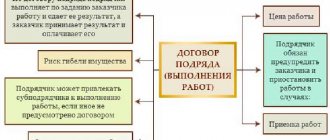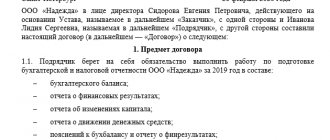From this article you will learn:
- When a claim is required to the contractor for violation of deadlines for completing work under 44-FZ
- What is a claim to a contractor for violation of deadlines for completing work under 44-FZ?
- Features of drawing up a claim to a contractor for violation of deadlines for completing work under 44-FZ
- How is a claim for violation of deadlines served?
- Frequently asked questions about filing a claim with a contractor for violation of work deadlines
According to 44-FZ, a claim to the contractor for violation of work deadlines or quality requirements can be made regardless of whether these shortcomings were significant or not. If, even after submitting a claim, the contractor refuses to correct his work, you have every right to terminate the contract unilaterally.
You can find out how to correctly file a claim, how to send it and what to do next in our article.
The concept of a penalty under the Civil Code of the Russian Federation and its types: legal or contractual
According to paragraph 1 of Art.
330 of the Civil Code of the Russian Federation (hereinafter referred to as the Civil Code of the Russian Federation), a penalty is a measure of civil liability for non-fulfillment or improper fulfillment of an obligation, including late fulfillment. It may be provided for by law or contract. In the latter case, the agreement on the penalty must be drawn up in writing (Article 331 of the Civil Code of the Russian Federation), otherwise this measure will not be considered established.
Let's consider what kind of penalty is possible in contractual relations. It happens in a row:
- household;
- construction;
- for design and survey work;
- for state and municipal needs.
In accordance with Art. 395, paragraph 1, art. 708, Art. 712, 723, 739, 754, 761 of the Civil Code of the Russian Federation, the main measures of influence on the violator under a contract transaction are:
- retention of work results in case of late payment;
- free elimination of defects, proportionate price reduction, reimbursement of expenses for eliminating defects;
- recovery of damages;
- collection of interest for the use of other people's funds.
Legal penalties under a contract are provided only for state (municipal) contracts (Parts 6–9, Article 34 of the Law “On the Contract System...” dated 04/05/2013 No. 44-FZ). For other types of contractual relations, such a measure is not prescribed by current legislation. Consequently, a penalty under a work contract under the Civil Code of the Russian Federation can only be contractual, and only under this condition is it recovered from the guilty party.
The Supreme Court clarified the nuances of levying a penalty in case of violation of work deadlines
The Judicial Collegium for Economic Disputes of the Supreme Court issued Ruling No. 308-ES19-27287 on a dispute between participants in a subcontract agreement regarding the collection of arrears in payment for work performed and penalties for late completion.
From 2012 to 2014, Mobile Mechanized Column Russian LLC (general contractor) and 711 Voenproekt LLC (subcontractor) entered into 6 subcontract agreements for design and survey work.
Subsequently, the subcontractor filed a lawsuit against the general contractor for the collection of debt under subcontract agreements, and the latter filed a counterclaim for the collection of penalties for violating the terms of contractual work (cases No. A63-9366/2017, A63-9367/2017, A63-9369/2017 , A63-9370/2017, A63-9409/2017, A63-9549/2017). On October 10, 2021, during the consideration of these legal disputes, the parties signed an agreement to resolve mutual claims related to violation of payment terms for contractual work performed by the subcontractor and their quality. The participants established a debt repayment schedule by the general contractor for the period from November 30, 2021 to October 31, 2021 in the amount of 99 million rubles. In turn, the subcontractor undertook to eliminate deficiencies and defects during construction and installation work.
Since the general contractor did not repay the debt, 711 Voenproekt filed a claim with the arbitration court to collect it and collect interest for the use of other people's funds. In turn, PMK Russkaya filed a claim for a penalty in connection with the counterparty’s violation of the deadlines for completing the work.
The courts of the first and second instances partially satisfied the subcontractor's claim, collecting 30 million rubles from the defendant. They also satisfied the counterclaim of PMK Russkaya, recovering over 10 million rubles in favor of the company. Satisfying the counterclaim, both courts established the fact that the subcontractor violated the deadlines for completing the work, recognizing the calculation of the amount of the penalty and the concluded agreement on mutual claims as correct. At the same time, the courts noted that the delay in fulfilling the obligation under the subcontract agreement dated October 10, 2013 occurred from December 30, 2014, that is, from the deadline established by the parties in the contract for the completion of work, until their actual completion on August 30, 2021. Since the plaintiff went to court on March 4 of the following year, the statute of limitations for collecting the penalty is not missed for the period from February 3, 2016 (March 4, 2021 minus one year and one month to comply with the claim procedure) to August 30, 2021 (date of actual fulfillment of the obligation).
Subsequently, the district court overturned the judicial acts of the lower authorities regarding the collection of penalties in favor of the general contractor. The cassation found that the PMK Russkaya company missed the deadline for collecting penalties for all stated claims. The third instance concluded that the statute of limitations is limited to the three-year period following the day on which the deadline established in each contract for the completion of work, which had already expired on the date of the appeal to the court, thereby ignoring the date of actual completion of the work by the subcontractor.
In its cassation appeal to the Supreme Court, the general contractor indicated that the penalty was charged for violating the deadlines for completing work, which was completed by the subcontractor significantly later than the contractual deadlines. Due to the ongoing violation by the subcontractor of the terms of the contracts, the penalty provided for by them represents a “current” measure of liability, subject to accrual for each day of delay in fulfilling the obligation. In this regard, the limitation period for the collection of penalties must be calculated separately for each day of delay.
After studying the materials of case No. A63-26522/2018, the Judicial Collegium for Economic Disputes of the Supreme Court did not agree with the conclusion of the district court, since when determining the period of the penalty to be collected, it is necessary to proceed from the three-year period preceding the date of filing a claim in court, which was done by the courts of the first and appellate courts. Both of these authorities, taking into account the date of actual fulfillment by the subcontractor company of its obligations under the contracts, did not consider the expiration of the three-year period before the PMK Russkaya company applied to the arbitration court.
“The cassation court did not take into account that the accrual of the penalty continued every day until the subcontractor actually performed the work under the contracts, which is consistent with the explanations contained in paragraph 25 of the Resolution of the Plenum of the Supreme Court of the Russian Federation dated September 29, 2015 No. 43 on certain issues related with the application of the rules of the Civil Code of the Russian Federation on the limitation period, according to which the limitation period for a claim for the collection of a penalty (Article 330 of the Civil Code of the Russian Federation) or interest payable according to the rules of Art. 395 of the Civil Code of the Russian Federation, is calculated separately for each overdue payment, determined in relation to each day of delay,” noted in the definition.
The Supreme Court noted that the position of the courts of first and appellate instances corresponds to the legal position of the highest courts and established judicial practice. In this regard, he canceled the cassation ruling and upheld the judicial acts of the first and second instances.
Calculation of penalties under a contract: construction, household and other types
In any contract, the penalty is established in the form of a fine or penalty. Depending on this, its calculation is carried out:
- A fine is a lump sum that can be set as a fixed amount or as a percentage. The provision regarding the fine is considered agreed upon if the text states its amount and cases of payment.
When the fine has a specific amount, it does not need to be calculated. If it is indicated as a percentage, it is determined by the formula:
Fine amount = Settlement amount × Percentage / 100,
where the settlement amount must be specified in the contract.
- The penalty is calculated, as a rule, as a percentage of the amount of the unfulfilled obligation for each day or other period of violation of obligations. The penalty is recognized as established when the text defines its size, terms of payment and the period of delay for which it is accrued. In the absence of the last condition - the period of delay - the penalty can be qualified as a fine and paid once.
If the penalty is set as a percentage per annum, it is calculated using the formula:
Penalty = (Settlement amount × Days of delay × Interest) / (Number of days in a year × 100).
If the penalty is determined as interest for each day, use the formula:
Penalty = (Settlement amount × Days of delay × Interest) / 100.
The settlement amount is determined based on the terms of the contract. The period of delay is from the next day after the last day of fulfillment of the obligation until the day of its actual fulfillment, inclusive (clause 65 of the Resolution of the Plenum of the Armed Forces of the Russian Federation “On the application by courts...” of March 24, 2016 No. 7, hereinafter referred to as Resolution No. 7).
Types of penalties
The rules by which a penalty is collected for failure to fulfill a work contract are prescribed in paragraph 2 of Chapter 23 of the Civil Code of the Russian Federation. It is collected for improper fulfillment by a party to a transaction of its obligations in the form of:
- fine;
- penalties.
The fine for delay in a work contract is collected at a time either in a fixed amount or in an estimated (percentage) amount of the amount of non-payment by the customer or the cost of work not performed by the contractor.
As compensation for non-compliance with deadlines, a penalty is applied for delay in the contract, calculated for a time period: hour, day, month, etc. When it is applied, its size, period, from when and until when it is calculated are prescribed. For example, if there is a delay in the delivery of work, penalties are collected from the date of delivery under the terms of the contract until the actual date of delivery of the work.
Pre-trial settlement
If the case for the collection of a penalty is being considered in an arbitration court, before filing a statement of claim in an imperative manner, you must follow the procedure for pre-trial resolution of the dispute by filing a claim (Part 5 of Article 4 of the Arbitration Procedure Code of the Russian Federation, hereinafter referred to as the Arbitration Procedure Code of the Russian Federation). Otherwise the court:
- will leave the application without progress or return it (part 1 of article 128, clause 5 of part 1 of article 129 of the Arbitration Procedure Code of the Russian Federation);
- will not consider the claim if it was nevertheless accepted (clause 2, part 1, article 148 of the Arbitration Procedure Code of the Russian Federation).
The claim is made in free form. It is recommended to indicate:
- date and place of filing the claim;
- complete information about its recipient and sender;
- list of committed violations;
- a link to the article of the contract providing for a penalty;
- calculation of the amount of the penalty;
- voluntary payment period;
- details for transfer;
- details of the person signing the claim.
The form for a claim for payment of a penalty is available in the ConsultantPlus system. If you don't have access to K+, get a free trial and proceed to the document.
You can submit a claim in several ways:
- hand over in person against signature;
- send by a valuable letter with a list of the attachment to the address specified in the contract or the address from the Unified State Register of Legal Entities/Unified State Register of Individual Entrepreneurs (clause 63 of the resolution of the Plenum of the Armed Forces of the Russian Federation “On the application by courts...” of June 23, 2015 No. 25).
If the guilty party has not received the letter, a claim can be filed after the period for storing the letter at the post office has expired. Correspondence is stored for 30 days from the date of receipt at the post office.
How and when to file a penalty for collection?
To make a claim for monetary compensation, it is necessary to complete the work under the contract or terminate it. Compliance with this norm is necessary, since the penalty for failure to fulfill obligations under a work contract is calculated up to the day the work begins or ends (depending on how the period is formulated in the contract). You can make a claim earlier by calling on the debtor to complete the work and indicating the amount of the penalty that has already accrued.
box_color=”#64ec44″ title_color=”#1d1313″]At the time of completion of cooperation, recalculation is performed. This can only be done in the case of pre-trial, voluntary fulfillment of the demand by the debtor. Judicial collection of a penalty for delay under a work contract involves filing a statement of claim indicating the exact amount.[/su_box]
Statement of claim for recovery of penalties under a contract
Before submitting an application, you must determine the jurisdiction. As a general rule, a claim for the recovery of a penalty under a work contract is filed with the arbitration court at the location or residence of the defendant. Although the contract may determine another court (Article 37 of the APC).
The claim is drawn up in accordance with the provisions of Art. 125 Arbitration Procedure Code of the Russian Federation. As a rule, the requirement to collect a penalty under a construction contract and other types of contract is additional to the main one - the fulfillment of certain conditions (payment of the contract, implementation of work, etc.). But it can also be independent.
The form for a statement of claim for the recovery of a penalty under a contract is available in the ConsultantPlus system. Get trial access to K+ for free and proceed to the document.
Documents are attached to the statement of claim according to the list from Art. 126 Arbitration Procedure Code of the Russian Federation. There must be an agreement and calculation of the penalty. As we have already said, the amount of the penalty is calculated in accordance with the terms of the contract.
After paying the state fee and sending the appropriate package of documents to the defendant and other participants in the process, the statement of claim with all attachments can be filed with the court.
The guilty party will pay a penalty under the contract regardless of whether the plaintiff stated this requirement in court or not (resolution of the Ninth Arbitration Court of Appeal dated April 24, 2007 No. 09AP-4374/2007-GK in case No. A40-79402/06-62-233 ). At the same time, recognition of the principal debt by the defendant will not be an automatic recognition of the penalty.
Disputes and termination of contract
Today, disputes under construction contracts are very relevant, which is confirmed by the official statistics of the Supreme Arbitration Court, according to which in 2012 the number of disputes under such contracts amounted to approximately 9% of all disputes considered.
Despite the fact that the legislation in this area is formulated quite clearly and supplemented by reviews and explanations of the Supreme Arbitration Court, and judicial practice is very extensive, experienced lawyers do not consider debt collection under a work contract to be easy to resolve.
First of all, this is due to the fact that the process of proof is very complicated due to the presence of a large volume of technical and other documentation, the need to conduct numerous examinations, as well as widespread deviations of the parties from complying with the terms of the contract.
The main subjects of such disputes are:
- collection of debt from the customer for payment for contract work;
- collection of penalties under a contract for violation of obligations regarding the timing and scope of work;
- elimination of deficiencies that arose as a result of non-fulfillment or improper fulfillment by the contractor of its obligations under the contract.
To prove in an arbitration dispute that the work under the contract was completed efficiently and on time, it is necessary to provide the court with properly executed documents, in particular:
- construction agreement (with the necessary attachments and additions);
- certificate of expenses and cost of work performed;
- work log;
- act of acceptance of completed work.
It should be noted that in the overwhelming majority of cases, the very cause of such disputes is an illiterately drawn up contract, the essential terms of which are not formulated clearly enough, and are often completely absent, resulting in numerous legal disputes.
At the same time, a correctly drawn up contract agreement is the best proactive measure to prevent financial costs for any kind of legal costs, therefore, when drawing up a contract agreement, it is recommended to seek the services of experienced lawyers.
Cases of reduction of penalties
Art. 333 of the Civil Code of the Russian Federation gives the guilty person the right to ask the court to reduce the penalty. To do this, some conditions must be met:
- If the violator is an individual entrepreneur or an organization, the court may consider reducing the sanctions only after receiving a statement or petition from the guilty person. Moreover, such an appeal is not considered evidence or recognition by the defendant of the fact of violation of the contract (clause 71 of Resolution No. 7).
- At the same time, the defendant’s objections cannot be considered a petition for the proportionality of measures of responsibility (resolution of the Presidium of the Supreme Arbitration Court of the Russian Federation dated June 17, 2014 No. 1850/14 in case No. A40-140910/12-134-1087, dated October 22, 2013 No. 801/13 in case No. A40-118783/11-59-1052).
- In addition, in his application, the violator must prove that satisfying the requirements for a penalty will lead to unjust enrichment of the plaintiff (clause 77 of Resolution No. 7).
- If the defendant is another person, the court may reduce the penalty on its own initiative (clause 71 of Resolution No. 7).
- The court cannot reduce the penalty for monetary obligations below interest on bank deposits of individuals in the region where the case is being considered (clause 72 of Resolution No. 7).
Restriction of the right or waiver of the right to ask for a reduction in the penalty is void (clause 69 of Resolution No. 7).
What requirements can be put forward in a claim?
Regarding the requirements, it all depends on which clauses of the contract were violated. They may concern:
- the cost of performing work in terms of reduction (if the work is not completed in full, of poor quality or not on time);
- compensation for unsatisfactorily performed work;
- termination of the contract;
- reimbursement of costs incurred, etc.
In addition, if the terms of the agreement are violated, each party may insist on paying a penalty, even in cases where this provision is not stated in the main document (here Article 332 of the Civil Code of the Russian Federation comes into force, which makes such an agreement void).
Judicial practice on the collection of penalties
Let's look at the most interesting cases from judicial practice, illustrating common problems of collecting penalties under a contract:
- The parties may stipulate in the transaction a condition that the customer withhold a penalty upon final payment for the work. In this case, there is no need to go to court. This possibility was also supported by the highest court (resolutions of the Presidium of the Supreme Arbitration Court of the Russian Federation dated June 19, 2012 No. 1394/12 and dated July 10, 2012 No. 2241/12). This judicial practice for collecting penalties under a contract can be used by companies in their activities.
- If the implementation of a work contract is divided into intermediate stages, the plaintiff does not have the right to charge a penalty for the entire amount, but is obliged to reduce it by the cost of work already completed (resolution of the Far Eastern District of 01.09.2017 No. F03-3172/2017 in case No. A73-15641/ 2016).
- If previously the penalty for late payment for work was accrued without VAT, now it is calculated on the full amount, including VAT (resolution of the Federal Antimonopoly Service of the Volga District dated November 24, 2011 in case No. A12-3382/2011).
- According to established judicial practice, a contract can provide for a penalty clause in favor of the party that refused the transaction, if the refusal occurred through the fault of the other party. This condition does not contradict the law (resolution of the Presidium of the Supreme Arbitration Court of the Russian Federation dated June 11, 2013 No. 1396/12 in case No. A55-25605/2010).
- Contract provisions imposing penalties for each individual defect are not considered illegal. The courts consider such measures as a penalty (resolution of the Federal Antimonopoly Service of the East Siberian District dated June 15, 2010 in case No. A33-20347/2009).
Legislative framework for arbitration consideration of disputes under construction contracts
When arbitrating disputes in this category, courts are guided by:
- Civil Code of the Russian Federation.
- Federal Law dated February 25, 1999 N 39-FZ (as amended on January 2, 2000) “On investment activities in the Russian Federation carried out in the form of capital investments.”
- Federal Law of 08.08.2001 N 128-FZ (as amended on 11.03.2003) “On licensing of certain types of activities.”
- Town Planning Code of the Russian Federation.
- Information letters of the Presidium of the Supreme Arbitration Court of the Russian Federation dated 01/24/2000 N 51 “Review of the practice of resolving disputes under construction contracts”, dated 07/25/2000 N 56 “Review of the practice of resolving disputes by arbitration courts related to contracts for participation in construction”, dated 01/18/2001 N 58 “Review of the practice of resolving disputes related to the protection of foreign investors by arbitration courts.”
- Letter of the Federal State Statistics Service dated May 31, 2005 N 01-02-9/381 “On the procedure for applying and filling out unified forms of primary accounting documentation N KS-2, KS-3 and KS-11.”
- Resolution of the State Committee of the Russian Federation on Statistics dated November 11, 1999 N 100 “On approval of unified forms of primary accounting documentation for recording work in capital construction and repair and construction work.”
Also, it is important for the parties to the contract to remember that its essential terms are the subject and timing of the work, so they must be specified without fail. If the contract does not contain data on the specified conditions, it is considered not concluded.
Payment under the contract, quality of work and payment procedure are also important provisions of the contract.




